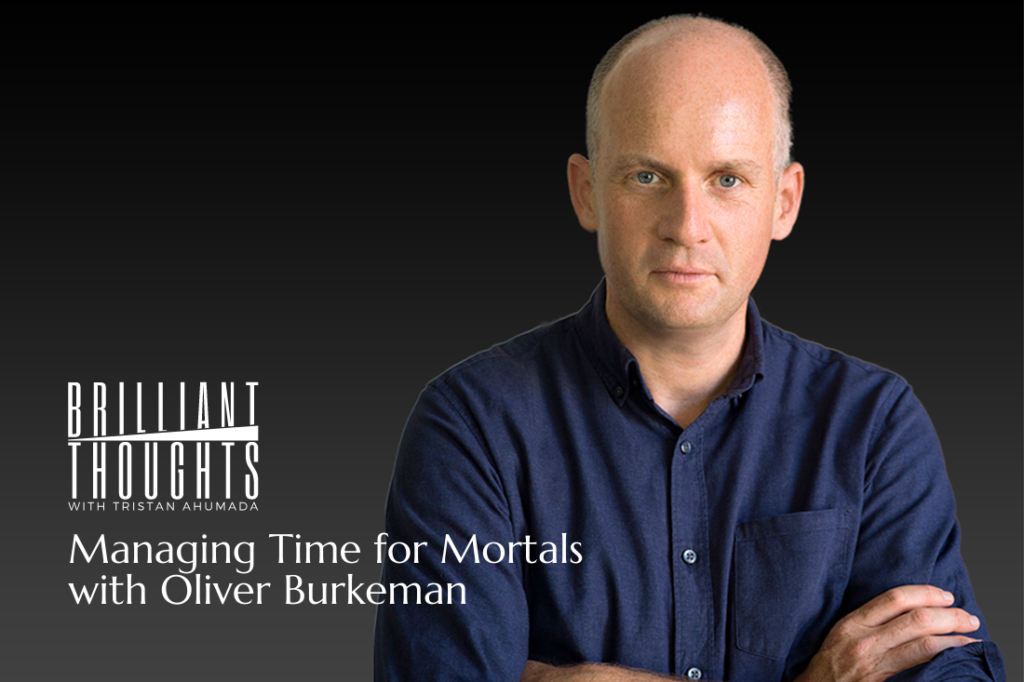“Life is time management.”
That’s what Oliver Burkeman, a self-proclaimed productivity geek, says about the state of the world today. Some people see time management as a tiny part of life, a sort of game for people who enjoy meal prepping on weekends and writing long to-do lists. But he offers a different perspective, one that views productivity as a function of well-being.
“We have this finite amount of time,” Burkeman says. “You can’t do everything. You can’t even do most things. So we have to make some wise choices to feel like we have accomplished, enjoyable and meaningful lives.”
In this episode of Brilliant Thoughts, Burkeman talks to SUCCESS People Editor Tristan Ahumada about the mindset people should bring to productivity. They discuss the unique viewpoints in Burkeman’s book, Four Thousand Weeks: Time Management for Mortals, which is a philosophical guide to productivity.
Most of Burkeman’s advice is about toxic productivity and how to avoid it. Here are three things to remember as you heal your relationship with time.
Productivity 101: Faster isn’t always better.
Why do we rush to get things done in a predetermined amount of time? If it takes six months to start a business, hypothetically, why force an impossibly quick deadline?
We can mostly blame instant gratification. The feeling of wanting something to happen and then receiving that experience in record time is addictive. The internet, in particular, has trained us to see every purchase or piece of information as “one click away.” But it’s hard to buy productivity the same way we buy a new wardrobe. Some tasks are best experienced at the rate of true mastery, not the deadlines we arbitrarily assign.
“There are all sorts of activities on every scale—things we do within a day or over the course of a year—that take the time they take,” Burkeman says. “They have a kind of built-in time that they need. Reading is a good example. People increasingly find it hard to focus on reading a book because lots of other information comes to us instantaneously.”
Productivity isn’t about being fast; it’s knowing which tasks are worth slowing down to complete. When you feel the urge to rush through something, think of the end goal. How important is the job? Will rushing through it create better results than slowing down? If you need more time, have mini work sessions throughout the week instead of completing a task in one sitting. You’ll make fewer mistakes and avoid the time-suck of starting over.
Doing fewer tasks can make you more productive.
Have you heard of the Pomodoro Technique? Successful people use this productivity hack to manage their time and get stuff done. You start by working 25 minutes and following up with a five-minute break. Once you’ve done that four times, you can take a longer break of 20 minutes or so.
Burkeman says the Pomodoro Technique is a brilliant way to stay productive. Even still, the mindset you bring to it can either boost or flatten your productivity. That’s because many people use the technique to cheat time itself. They cram dozens of tasks into an eight-hour window, which isn’t helpful in the long run.
And honestly, what could be more relatable? We’re all under pressure to perform at work—and quickly.
“We get up in the morning, and we feel like we’re in a productivity debt,” Burkeman says. “We have to pay off our productivity to get back to a zero balance. If you get a salary from a company, you sort of are in a productivity debt. But the existential point I’m trying to make is, do you feel like you’re even allowed to be here if you’re not producing stuff?”
If your answer to Burkeman’s question is no, re-examine what it means to be productive. According to Burkeman, we should all accept that:
- We’re never going to feel like time is on our side. Humans are a finite resource, and the number of things we can achieve is nearly infinite. When it comes to controlling time, the math isn’t in our favor.
- Less can be more if you focus on what’s important. Doing a couple of crucial tasks will take you further than prioritizing less impactful tasks.
- Your job (and how well you do it) is not your worth. You’re already worthy. Your job is an expression of how you contribute to the world, and we need every kind of worker to maintain life as we know it. Whether you’re super productive or just average, that’s not going to change.
Embracing uncertainty is the best way to stay productive.
Focusing on the future instead of what you’ll do to get there becomes a major distraction. Instinctively, you put your trust in a scenario that hasn’t happened yet or might not happen at all. Any journey is filled with uncertainty, though. Sometimes choosing to continue, no matter how things change, is the most productive thing you could do.
That’s the tricky part of setting goals; they imply that there’s a destination, but sometimes there is no finish line. Goals transform as you learn new things and face unexpected obstacles along the way. You might not arrive at your exact destination, but the real treat is staying determined long enough to see that new, exciting place.
“You have to see plans for what they are: You orienting yourself, right now, in what seems like the most sensible way rather than attempting to dictate the future, which will cause massive frustration when the future decides to do something else,” Burkeman says.
Brilliant Thoughts with Tristan Ahumada is no longer releasing new episodes on the SUCCESS Podcast Network, but you can still listen to the full conversation below.





